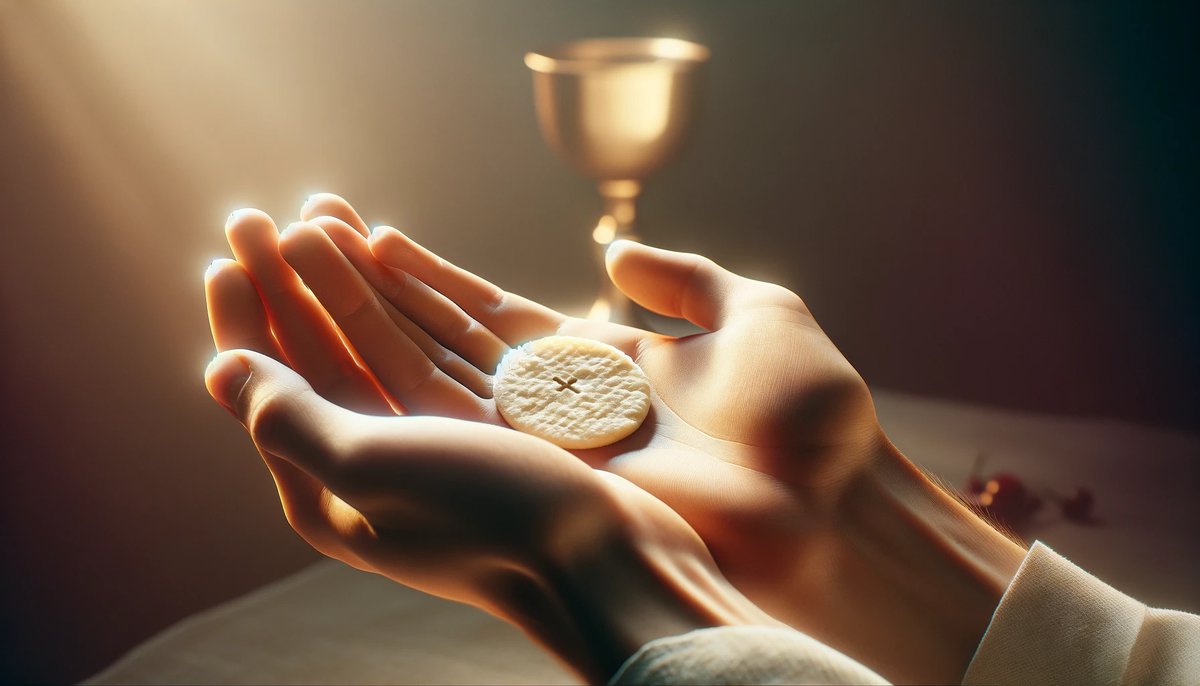Home>Christian Life>When Do You Say The Act Of Contrition During Confession


Christian Life
When Do You Say The Act Of Contrition During Confession
Published: March 4, 2024
Peter Smith, Editorial Director at Christian.net, combines deep insights into faith, politics, and culture to lead content creation that resonates widely. Awarded for his contributions to religious discourse, he previously headed a major organization for religious communicators, enhancing dialogue on faith's societal impacts.
Learn when to say the Act of Contrition during confession and understand its significance in the Christian life. Find guidance on the sacrament of reconciliation.
(Many of the links in this article redirect to a specific reviewed product. Your purchase of these products through affiliate links helps to generate commission for Christian.net, at no extra cost. Learn more)
Table of Contents
Understanding the Act of Contrition
The Act of Contrition is a prayer expressing sorrow for sins committed and a firm resolution to avoid committing them again. It is an essential part of the Sacrament of Confession in the Catholic Church. This prayer is a way for individuals to acknowledge their wrongdoing, ask for God's forgiveness, and commit to making amends. The Act of Contrition is a heartfelt expression of remorse and a sincere desire for reconciliation with God.
The Act of Contrition is a deeply personal and spiritual prayer. It is an opportunity for individuals to reflect on their actions, take responsibility for their mistakes, and seek forgiveness. By reciting the Act of Contrition, individuals acknowledge their imperfections and express a genuine desire to be reconciled with God. This prayer is a powerful reminder of the importance of humility, repentance, and the transformative power of God's mercy.
The Act of Contrition is rooted in the belief that God is loving and forgiving. It is an act of faith that acknowledges God's mercy and the opportunity for spiritual renewal. By reciting the Act of Contrition, individuals affirm their belief in God's compassion and their willingness to seek reconciliation. This prayer is a testament to the enduring hope for redemption and the belief that God's love is greater than any sin.
The Act of Contrition serves as a personal commitment to strive for moral and spiritual growth. It is a declaration of one's intention to turn away from sin and embrace a life of virtue. By reciting the Act of Contrition, individuals express their determination to live according to the teachings of the Church and to seek God's grace in their daily lives. This prayer is a powerful affirmation of the individual's desire to walk in the path of righteousness and seek God's guidance.
The Act of Contrition is a prayer of reconciliation and renewal. It is a way for individuals to seek God's forgiveness, express their remorse, and commit to living a life that is pleasing to God. This prayer is a profound expression of faith, humility, and the desire for spiritual transformation. The Act of Contrition is a reminder of the unending mercy of God and the opportunity for a fresh start in the journey of faith.
Read more: What Do You Confess During Confession
The Role of the Act of Contrition in the Sacrament of Confession
-
The Act of Contrition plays a pivotal role in the Sacrament of Confession, also known as the Sacrament of Reconciliation. It is an integral part of the process of seeking forgiveness for sins committed. The Act of Contrition serves as a sincere expression of remorse and a genuine desire for reconciliation with God. It is a way for individuals to take responsibility for their actions and seek God's mercy.
-
In the Sacrament of Confession, the Act of Contrition is a fundamental aspect of the penitential rite. It is a prayer that allows individuals to acknowledge their sins, express their sorrow, and ask for God's forgiveness. The Act of Contrition is a heartfelt plea for reconciliation and a commitment to amend one's ways. It is a crucial step in the process of seeking absolution and experiencing spiritual healing.
-
The Act of Contrition serves as a personal and intimate conversation with God. It is a moment of self-reflection and honesty, where individuals confront their shortcomings and seek God's grace. By reciting the Act of Contrition, individuals open their hearts to God, expressing their genuine desire to be forgiven and their willingness to make amends. This prayer is a powerful demonstration of humility and a sincere plea for God's loving mercy.
-
The Act of Contrition is a prayer of transformation and renewal. It is an opportunity for individuals to turn away from sin and embrace a life of virtue. By reciting the Act of Contrition, individuals express their commitment to living according to the teachings of the Church and seeking God's guidance in their lives. This prayer is a profound declaration of one's intention to grow spiritually and seek reconciliation with God.
-
In the Sacrament of Confession, the Act of Contrition is a vital part of the process of reconciliation. It is a prayer that embodies the essence of repentance and the hope for spiritual renewal. By reciting the Act of Contrition, individuals participate in the sacramental journey of seeking God's forgiveness and experiencing the transformative power of God's love. This prayer is a testament to the enduring mercy of God and the opportunity for a fresh start in the journey of faith.
When to Recite the Act of Contrition During Confession
-
After Confessing Sins: The Act of Contrition is typically recited after confessing one's sins to the priest. Once the individual has honestly and openly acknowledged their transgressions, the Act of Contrition follows as a sincere expression of remorse and a genuine desire for God's forgiveness.
-
Upon Receiving Instruction: In some cases, the priest may prompt the individual to recite the Act of Contrition after providing guidance or counsel. This serves as a moment for the individual to reflect on their sins, express their sorrow, and seek reconciliation with God.
-
Before Receiving Absolution: The Act of Contrition is often recited before the priest offers absolution. It is a crucial step in the process of seeking forgiveness and experiencing spiritual healing. By reciting the Act of Contrition, the individual demonstrates their genuine desire for reconciliation and their commitment to amend their ways.
-
As a Personal Reflection: While there is a traditional sequence for the recitation of the Act of Contrition during Confession, it can also serve as a personal reflection. Individuals may choose to recite the prayer silently or meditatively before or after Confession as a way to express their remorse and seek God's mercy.
-
In Response to the Priest's Guidance: If the priest provides specific guidance or counsel during the Confession, the Act of Contrition may be recited as a response to the spiritual direction offered. This allows the individual to express their willingness to seek forgiveness and make amends.
-
As a Symbol of Reconciliation: Reciting the Act of Contrition during Confession symbolizes the individual's desire for reconciliation with God. It is a heartfelt plea for God's mercy and a commitment to live a life in accordance with His teachings.
-
In Preparation for Receiving the Sacrament: The Act of Contrition can also be recited as part of the individual's preparation for receiving the Sacrament of Confession. It serves as a moment of self-examination and spiritual readiness before approaching the priest to confess their sins.
-
As a Step Towards Spiritual Renewal: Reciting the Act of Contrition during Confession marks a significant step towards spiritual renewal. It is an opportunity for the individual to acknowledge their imperfections, seek God's forgiveness, and commit to living a life of virtue.
By understanding when to recite the Act of Contrition during Confession, individuals can fully embrace the transformative power of this prayer in seeking reconciliation with God.
Importance of Saying the Act of Contrition in the Confessional
-
Acknowledgment of Responsibility: Saying the Act of Contrition in the confessional is crucial as it allows individuals to acknowledge their responsibility for their actions. By reciting this prayer, individuals express their awareness of their sins and their genuine remorse for their wrongdoing. This acknowledgment is the first step towards seeking reconciliation with God and embracing a life of virtue.
-
Expression of Sincere Remorse: The Act of Contrition serves as a powerful expression of sincere remorse for one's sins. In the confessional, this prayer becomes a heartfelt plea for God's forgiveness, demonstrating the individual's deep regret for their transgressions. By articulating their sorrow through the Act of Contrition, individuals open their hearts to God, seeking His mercy and grace.
-
Commitment to Amendment: Saying the Act of Contrition in the confessional signifies an individual's commitment to amend their ways. This prayer is a solemn declaration of the individual's intention to turn away from sin and embrace a life of righteousness. By reciting the Act of Contrition, individuals express their genuine desire to live according to the teachings of the Church and to seek God's guidance in their daily lives.
-
Receptivity to God's Mercy: The Act of Contrition is a profound expression of receptivity to God's mercy. In the confessional, this prayer becomes a testament to the individual's faith in God's loving forgiveness. By saying the Act of Contrition, individuals demonstrate their belief in the boundless mercy of God and their willingness to be reconciled with Him.
-
Preparation for Absolution: The Act of Contrition prepares the individual to receive absolution for their sins. By sincerely reciting this prayer in the confessional, individuals demonstrate their readiness to receive God's forgiveness and experience spiritual healing. The Act of Contrition serves as a vital step in the process of seeking absolution and experiencing the transformative power of God's love.
-
Personal Examination and Resolution: Saying the Act of Contrition in the confessional provides individuals with a moment for personal examination and resolution. It allows them to reflect on their actions, take responsibility for their mistakes, and express their genuine desire for reconciliation with God. This prayer is a deeply personal and spiritual commitment to seek God's grace and live a life that is pleasing to Him.
-
Restoration of Relationship with God: The Act of Contrition plays a significant role in the restoration of the individual's relationship with God. In the confessional, this prayer becomes a bridge for reconciliation, as individuals express their longing to be reunited with God. By reciting the Act of Contrition, individuals seek to mend their relationship with God and reaffirm their devotion to Him.
-
Spiritual Renewal and Transformation: Saying the Act of Contrition in the confessional marks a profound moment of spiritual renewal and transformation. It is an opportunity for individuals to seek God's forgiveness, express their remorse, and commit to living a life that reflects their faith. The Act of Contrition serves as a powerful catalyst for spiritual growth and a renewed dedication to the journey of faith.
By recognizing the importance of saying the Act of Contrition in the confessional, individuals can fully embrace the depth of this prayer as they seek reconciliation with God and strive for spiritual renewal.
Different Versions of the Act of Contrition
-
Traditional Act of Contrition: The traditional version of the Act of Contrition is a well-known prayer that has been recited by Catholics for generations. It typically begins with the words, "O my God, I am heartily sorry for having offended Thee." This version emphasizes sorrow for sin and the resolve to avoid future wrongdoing. It is a poignant expression of remorse and a sincere plea for God's forgiveness.
-
Contemporary Act of Contrition: In recent years, contemporary versions of the Act of Contrition have emerged, offering a more modern language and tone. These versions often retain the core elements of expressing sorrow for sin and the commitment to amend one's ways, but in a language that resonates with today's worshippers. The contemporary Act of Contrition seeks to maintain the prayer's relevance and accessibility in the context of modern worship.
-
Personalized Act of Contrition: Some individuals choose to personalize the Act of Contrition, crafting their own heartfelt expression of remorse and commitment to reconciliation. While adhering to the essential elements of the prayer, personalized versions allow individuals to convey their contrition in a deeply personal and meaningful way. This approach enables worshippers to articulate their sorrow and resolve in a manner that reflects their individual spiritual journey.
-
Cultural Variations of the Act of Contrition: Across different cultures and regions, variations of the Act of Contrition have emerged, incorporating local language and customs. These cultural adaptations maintain the core principles of expressing remorse and seeking forgiveness while embracing the unique linguistic and cultural nuances of diverse communities. Cultural variations of the Act of Contrition serve to unite worshippers in their shared faith while honoring their distinct cultural identities.
-
Child-Friendly Act of Contrition: Recognizing the importance of making the Act of Contrition accessible to children, child-friendly versions of the prayer have been developed. These versions use language and imagery that are easily understandable and relatable to young worshippers, allowing them to express their contrition in a way that resonates with their age and understanding. Child-friendly Act of Contrition versions aim to instill a sense of remorse and the desire for reconciliation in children as they grow in their faith.
-
Adapted Act of Contrition for Individuals with Special Needs: Inclusive versions of the Act of Contrition have been adapted to accommodate individuals with special needs, ensuring that the prayer is accessible to worshippers of all abilities. These adaptations may utilize simplified language, visual aids, or other accommodations to enable individuals with diverse needs to participate in the prayer of contrition and seek God's forgiveness in a manner that is meaningful to them.
-
Multilingual Act of Contrition: In multicultural and multilingual communities, multilingual versions of the Act of Contrition are utilized to accommodate worshippers who speak different languages. These versions allow individuals to express their contrition and seek reconciliation with God in their native language, fostering a sense of inclusivity and unity within diverse worship communities. Multilingual Act of Contrition versions celebrate the richness of linguistic diversity while emphasizing the universal themes of remorse and reconciliation.
-
Ecumenical Act of Contrition: In ecumenical settings, where worshippers from different Christian denominations come together, ecumenical versions of the Act of Contrition are employed. These versions emphasize the shared values of contrition and seeking forgiveness, transcending denominational differences. Ecumenical Act of Contrition versions serve to unite worshippers in their common faith and the universal need for reconciliation with God.
By recognizing the diverse versions of the Act of Contrition, worshippers can appreciate the prayer's adaptability and universality, allowing individuals to express their contrition and seek reconciliation with God in a manner that resonates with their unique spiritual journey.















